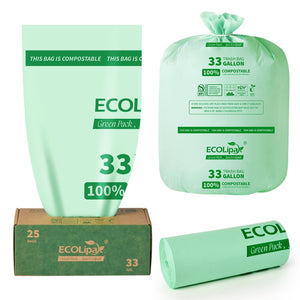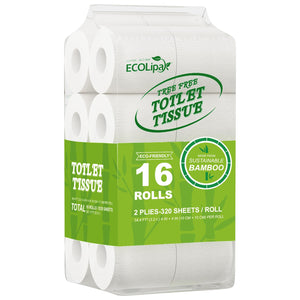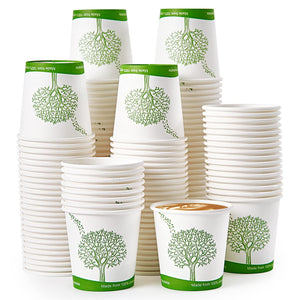You make one of the most impactful eco-decisions when you choose compostable bags for your home. The world faces a growing waste crisis, with the United States alone generating 951 kg of municipal waste per person each year—almost half ends up in landfills.
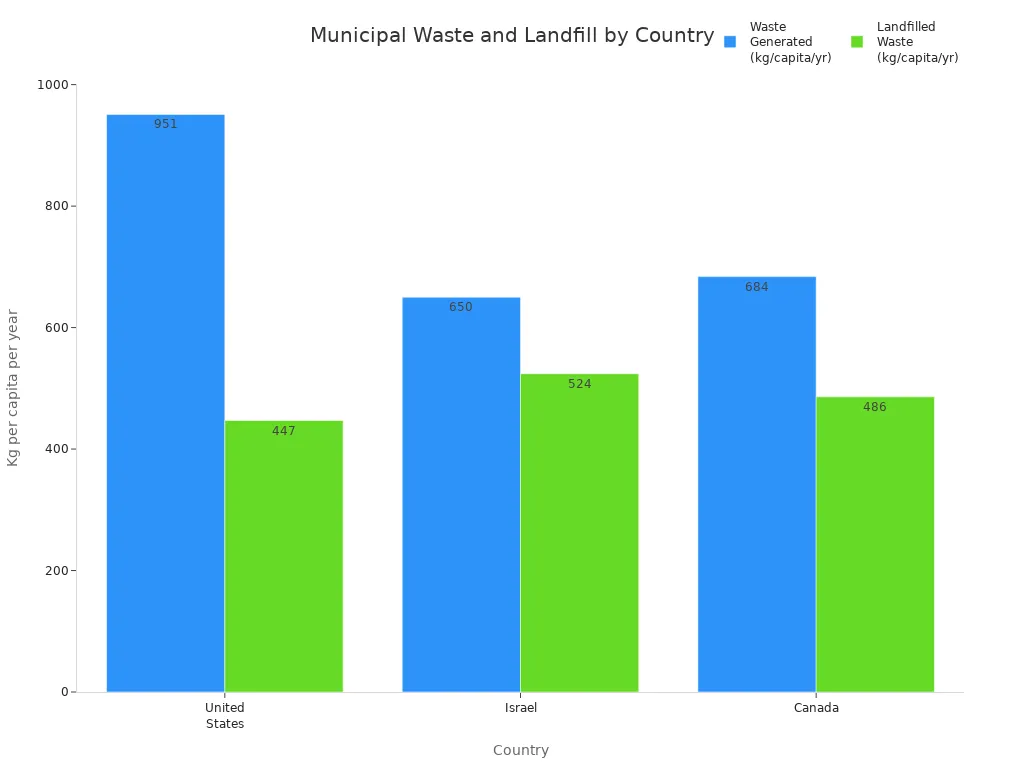
Compost bags help protect the environment, reduce pollution, and support a sustainable lifestyle. Ecolipak leads this transition by offering compostable solutions that make waste management simple and responsible.
Key Takeaways
Compostable bags reduce landfill waste by helping you separate organic waste for proper composting.
Using compostable bags lowers greenhouse gas emissions by preventing methane release from food waste in landfills.
Compostable bags break down faster and safer than plastic, protecting wildlife and reducing pollution.
Ecolipak compostable bags are strong, reliable, and certified to meet strict environmental standards.
Switching to compostable bags supports a circular economy and helps build a cleaner, healthier planet.
Environmental Impact of Compost Bags
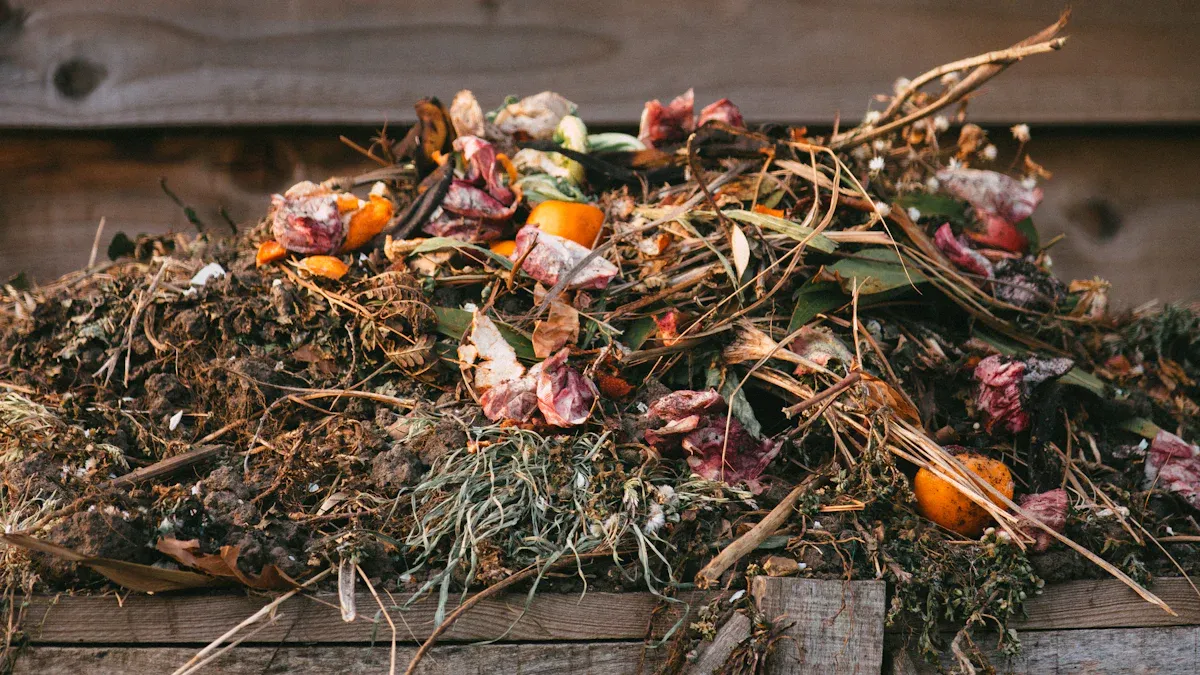
Reducing Landfill Waste
You play a vital role in protecting the environment when you choose compostable bags for your home or business. Compostable garbage bags help you collect food scraps and organic waste, making it easier to keep these materials out of landfills. When you use compostable packaging, you support organics diversion programs that send food waste to composting facilities instead of dumping it in landfills. This simple action helps reduce the amount of waste piling up in landfills.
However, studies show that not all compostable bags break down completely in real-world composting. Some bags leave behind small plastic fragments, which can end up in the soil. Even so, compostable garbage bags still help you separate organic waste from other trash, making composting food waste more convenient and effective. By using compostable packaging, you help divert waste from landfills, which is a key step toward environmental sustainability.
Ecolipak has made a real difference by selling over 59 million eco-friendly products in 2024. This achievement helped protect 125,000 square meters of green space. When you choose Ecolipak compostable garbage bags, you join a growing community that values green packaging and environmental responsibility.
Lowering Greenhouse Gas Emissions
When you send food waste to landfills, it breaks down without oxygen and produces methane, a greenhouse gas much stronger than carbon dioxide. Compostable bags help you collect and transport organic waste to composting facilities, where it breaks down with plenty of oxygen. This process stops methane-producing bacteria from growing, so less methane enters the atmosphere.
Compostable bags release fewer greenhouse gases during decomposition than traditional plastic bags. They break down into natural elements like carbon dioxide, water, and biomass, leaving no harmful residues. Compostable packaging also has a lower carbon footprint during production and disposal. By choosing compostable garbage bags, you help reduce greenhouse gas emissions and support a healthier environment for your family and community.
Tip: Always use compostable bags in places where industrial composting is available. This ensures the bags break down properly and deliver the best environmental benefits.
Protecting Wildlife
Plastic waste harms wildlife in rivers, oceans, and forests. Animals can mistake plastic bags for food or become tangled in them, leading to injury or death. Compostable bags offer a safer alternative because they break down faster than regular plastic bags, especially in composting facilities.
Field studies show that compostable bags degrade more quickly than traditional plastic in marine environments. While some fragments may remain, compostable packaging reduces the risk of long-term pollution. You help protect wildlife and natural habitats when you choose compostable garbage bags over plastic ones.
Ecolipak’s commitment to biodegradable and compostable packaging means you can trust their products to support environmental health. Every time you use Ecolipak compostable garbage bags, you take a step toward cleaner parks, rivers, and oceans.
Choosing green packaging is a simple way to show you care about the environment and the creatures that share our planet.
Compostable Bags vs. Plastic Bags
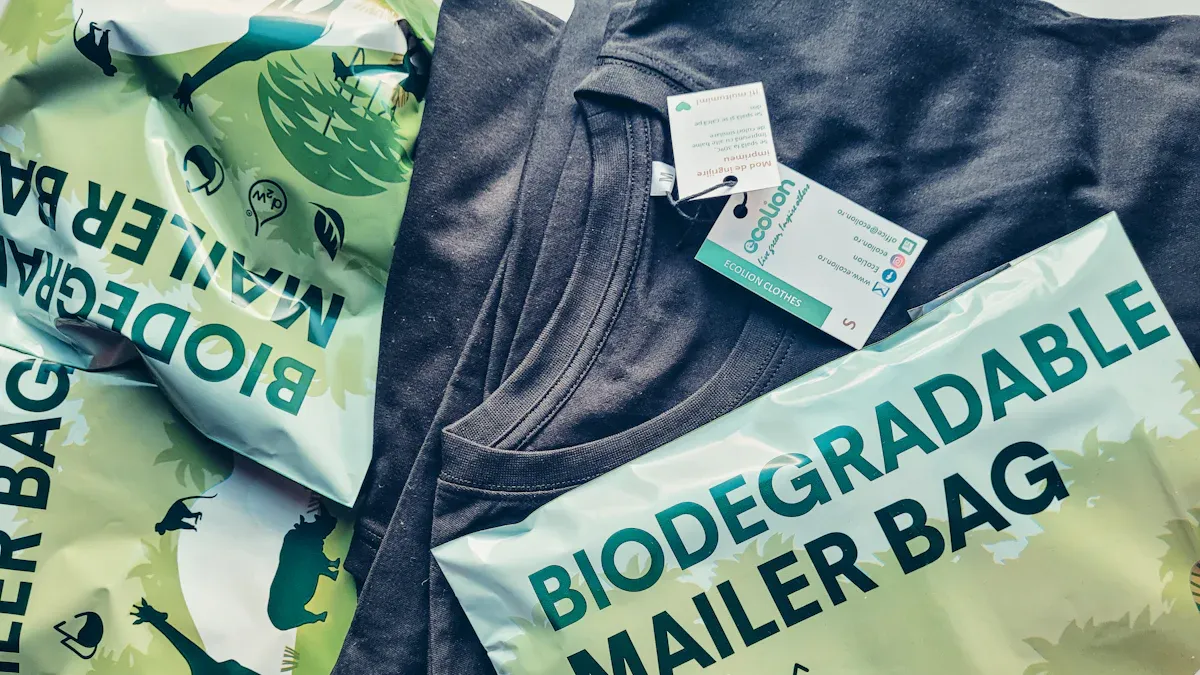
Biodegradability and Safety
You want to make choices that protect your family and the planet. Compostable bags give you a safer, more eco-safe option than plastic bags. These bags use plant-based materials, which means they break down naturally and do not leave behind harmful chemicals. Scientific studies show that compostable bags disappear much faster than plastic bags, especially in the right composting conditions. In some tests, plant-based biodegradable bags broke down completely within three months in marine environments, while plastic bags stayed whole for years. This quick breakdown helps keep soil, water, and air cleaner for everyone.
Plastic bags, on the other hand, can last for decades and often contain toxic chemicals. Even some biodegradable bags do not always break down as quickly or safely as compostable alternatives. When you choose compostable packaging, you help reduce pollution and keep your home and community healthier.
Choosing compostable bags means you support a cleaner, safer world for your children and future generations.
Practical Advantages
You want your trash bags to be strong, reliable, and easy to use. Ecolipak compostable bags deliver on all fronts. These bags are tear-resistant and can handle heavy loads without leaking. They fit standard kitchen bins and keep your kitchen fresh with built-in odor control. Unlike many low-cost compostable bags that tear easily, Ecolipak’s compostable packaging stands up to daily use.
Here’s a quick comparison:
Bag Type |
Tear-Resistance & Strength |
Odor Control |
Environmental Impact |
|---|---|---|---|
Ecolipak Compostable Bags |
Strong, durable, leak-resistant |
Excellent |
Breaks down fully, eco-safe |
Plastic Bags |
Strong, but polluting |
Poor |
Lasts for decades, pollutes |
You get the best of both worlds: a bag that works for your busy life and supports environmental goals. Compostable bags from Ecolipak offer a practical, healthy, and responsible choice for your family. Make the switch to compostable packaging and join the movement for a cleaner planet.
Compostable Garbage Bags and the Future of Waste Management
Supporting a Circular Economy
You want your choices to matter for the planet. Compostable garbage bags help you do just that by supporting a circular economy. Instead of relying on fossil-fuel plastics, you use bags made from renewable, non-GMO plant-based materials. These compostable bags break down quickly into nutrient-rich compost, so your organic waste returns safely to the soil. This process closes the resource loop and keeps valuable materials in use.
Here’s how compostable garbage bags drive the circular economy:
You choose bags made from renewable plants, not petroleum.
You collect food scraps and organic waste in these compostable bags.
Composting facilities turn your waste into healthy soil, not landfill pollution.
You help regenerate resources and reduce environmental impact.
Compostable packaging, including garbage bags, plays a key role in modern waste management. Cities like Milan have shown that using compostable bags in municipal composting programs diverts tons of organic waste from landfills. This reduces pollution and helps regenerate soil nutrients. When you use compostable garbage bags, you support a system where nothing goes to waste.
Compostable bags make it easy for you to be part of a green packaging revolution. Every bag you use helps build a cleaner, healthier future.
Ecolipak compostable trash bags fit perfectly into this vision. They are certified compostable, so you know they meet strict standards for breaking down safely. By choosing Ecolipak, you join a movement that values resource reuse, regeneration, and a sustainable way of living.
Meeting Sustainability Demands
You see the world changing. More people want sustainable packaging, and businesses must keep up. Compostable bags help you and your community meet these new demands. They are not just good for the planet—they help companies follow important rules and show real environmental responsibility.
When you use certified compostable bags, you get peace of mind. These bags meet strict standards like ASTM D6400, EN 13432, BPI, and TUV OK Compost. This means they break down safely in composting facilities and leave no harmful residues. Businesses that use certified compostable packaging can easily comply with national and international sustainability regulations. These certifications also build trust with customers who care about green packaging and eco-friendly practices.
Certification guarantees compostable bags meet compostability and safety standards.
Bags with OK compost INDUSTRIAL certification comply with the EU Packaging Directive.
Certified compostable bags help businesses follow waste management laws and improve their brand image.
You are not alone in wanting better choices. Surveys show that 89% of people want local councils to collect compostable packaging, and 85% support banning regular plastics if compostable options exist. Big companies like Unilever and Nestlé now promise to use only recyclable, compostable, or biodegradable packaging by 2025. The food and beverage industry leads the way, investing in smart, compostable packaging that keeps products fresh and safe.
Let’s look at some recent trends in compostable packaging:
Date |
Development/Investment |
Description |
|---|---|---|
January 2025 |
Fresh-Lock and TIPA launched a fully home compostable pouch for True Dates |
Supports environmental impact reduction. |
November 2024 |
UPM Specialty Papers and Eastman introduced bio-based coated paper |
Combines biopolymers and barrier papers for food packaging. |
October 2024 |
Nua Cosmetics, ITC Packaging, and ADBioplastics created compostable PLA bio-based bottle |
Focuses on eco-friendly infant care packaging. |
September 2024 |
Pakka launched new flexible compostable packaging line |
Targets food and beverage sectors. |
April 2024 |
Eastman and SEE launched lightweight certified compostable tray |
Replaces polystyrene foam in protein packaging. |
August 2024 |
Pakka Limited secured USD 29.2 million funding |
Builds first compostable flexible packaging plant in India. |
October 2023 |
Pakka and Brawny Bear introduced compostable flexible packaging |
Strengthens global leadership in compostable packaging. |
Ecolipak stands out as a leader in sustainable packaging. The brand sold over 59 million eco-friendly products in 2024, protecting 125,000 square meters of green space. Ecolipak’s compostable trash bags use polylactic acid, a material known for its eco-friendliness and versatility. The company’s commitment to innovation and quality means you get compostable bags that are strong, reliable, and truly sustainable.
When you choose Ecolipak compostable garbage bags, you help shape the future of waste management. You support a world where packaging is safe, green, and part of a healthy cycle.
You have the power to drive change. By making compostable packaging part of your daily life, you help create a future where waste becomes a resource, not a problem. Ecolipak’s green packaging solutions make it easy for you and your family to live sustainably and protect the planet for generations to come.
Transition to Compostable Bags
Steps for Individuals
You can make a big difference by choosing compostable bags for your home. Start your transition to compostable bags with a clear plan. First, decide to switch and commit to eco-friendly waste management. Use color-coded bins to sort your trash into compostables, recyclables, reusables, and donations. Pick certified compostable bags that meet international standards. These bags break down into natural elements, enriching the soil when composted properly. Use compostable bags for food scraps, paper, and fabrics. Set up composting setups at home to turn waste into valuable compost for your garden. Keep your trash area clean and ventilated by emptying bins often. Teach your family about compostable bags so everyone uses them correctly.
Decide to switch to compostable bags.
Sort waste with color-coded bins.
Choose certified compostable bags.
Use compostable bags for the right types of waste.
Set up home composting setups.
Keep trash areas clean.
Involve your family in the transition.
Tip: Compostable bags need the right conditions to break down. Use them with home compost piles or local composting facilities for best results.
Solutions for Businesses
You can lead the way in sustainable waste management by using compostable bags at work. Partner with commercial composting services to turn organic waste into valuable compost. Check with local providers to make sure they accept compostable bags and look for certification labels. Follow community guidelines for sorting and disposal. Label compostable waste bins clearly to avoid contamination. Teach employees and customers how to use compostable bags correctly. Consider on-site composting setups if your business produces a lot of organic waste. Many businesses save money and boost their reputation by making the transition to compostable bags.
Step |
Action |
|---|---|
Verify Acceptance |
Check with local composting services for compostable bag acceptance |
Label Bins |
Use clear labels to prevent contamination |
Educate |
Train staff and customers on compostable bag use |
Collaborate |
Work with waste management providers |
Set Up Composting |
Install on-site composting setups if possible |
Overcoming Challenges
You may face some challenges during the transition to compostable bags. Compostable bags cost more to produce than plastic bags, but you can manage costs by scaling up gradually. Work with packaging partners to find cost-effective solutions. Take advantage of grants, subsidies, and tax breaks for sustainable practices. Educate your customers about the benefits of compostable bags to build loyalty and justify price changes. Infrastructure for composting is still growing, but more cities and businesses are investing in composting setups. Legislative support and consumer demand make the transition easier. By choosing compostable bags, you help protect the planet and improve your brand’s reputation.
Choosing compostable bags is a smart investment in a sustainable future. You help reduce waste, support healthy communities, and inspire others to make eco-friendly choices.
You help create a cleaner future when you choose compostable bags. Compostable garbage bags reduce pollution, lower your carbon footprint, and make composting easy for everyone. Ecolipak leads the way with strong, water-resistant, and eco-friendly solutions.
Compostable bags protect soil and water, support healthy communities, and improve brand image for businesses.
They encourage sustainable habits and make waste management simple for families.
Action |
Impact |
|---|---|
Switch to compostable bags |
Reduce landfill waste, support green living |
Educate others |
Build a community focused on sustainability |
Make the switch today. Inspire your family, friends, and workplace to support eco-friendly waste management.
FAQ
Are Ecolipak Compostable Trash Bags safe for your family?
You can trust Ecolipak bags. They use plant-based materials and contain no BPA or harmful chemicals. You protect your family’s health and the environment every time you use them.
How long do Ecolipak Compostable Trash Bags take to break down?
You see results fast. These bags decompose in 3–6 months under composting conditions. You help reduce landfill waste and support a cleaner planet.
Can you use Ecolipak Compostable Trash Bags for heavy kitchen waste?
You get strong, tear-resistant bags. Ecolipak bags handle heavy loads without leaking. You keep your kitchen clean and odor-free with every use.
Do Ecolipak Compostable Trash Bags fit standard kitchen bins?
You enjoy easy use. These bags fit most kitchen bins, including SimpleHuman models. You never struggle with bag size or shape.
Why should you switch to compostable trash bags?
You make a real impact. Compostable bags help you cut plastic waste, protect wildlife, and support green living. You inspire others to choose eco-friendly solutions.
🌱 Every bag you use brings your family closer to a healthier, greener future!




